

GCSE Science Chemistry Unit 1. Lesson 28. Uses of gases in the air. Science of Learning. Guess Which Immune Component! game. Download our card game, which is all about the different cells and proteins found in the immune system How to play Play in pairs.
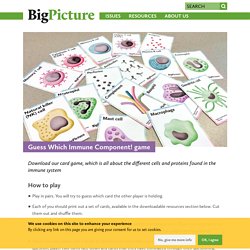
You will try to guess which card the other player is holding.Each of you should print out a set of cards, available in the downloadable resources section below. Cut them out and shuffle them.Player one picks out a card from their set, and keeps it hidden from player two. Player two lays out their cards in front of them, face up. Cards featured are: Basophil, Mast cell, Dendritic cell, Macrophage, Eosinophil, Neutrophil, Natural killer cell, Plasma B cell, Memory B cell, Memory T cell, Helper T cell, Cytotoxic T cell, Antibodies, Complement, Perforins, Antigens For more on the immune system and to work out what questions you could ask, see our poster.
Suggested questions Try these questions to get your game started – they’re not in any particular order. Bozeman Science. Planning to be great. The new year is well underway at Durrington High School.
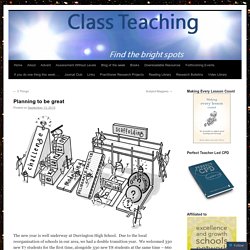
Due to the local reorganisation of schools in our area, we had a double transition year. We welcomed 330 new Y7 students for the first time, alongside 330 new Y8 students at the same time – 660 new students in all! To facilitate this, over the summer a major building project was completed, comprising a new teaching block, performing arts studio, full size astropitch and sports pavilion. And of course, to complete the package – 40 new staff! So, it’s back to our core business – great teaching in the classroom. The quote above should underpin our teaching – if students are going to believe that they can be successful, they need to experience success. The Sutton Trust report, ‘What Makes Great Teaching? Content knowledge. Quality of instruction. 8 Strategies Robert Marzano & John Hattie Agree On. Robert Marzano and John Hattie have both reviewed research into what teaching strategies make the biggest difference to students’ results.
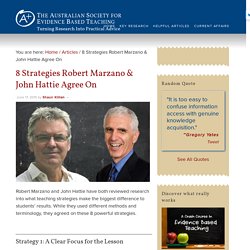
While they used different methods and terminology, they agreed on these 8 powerful strategies. Strategy 1: A Clear Focus for the Lesson. Top 10 Evidence Based Teaching Strategies. Most teachers care about their students’ results.
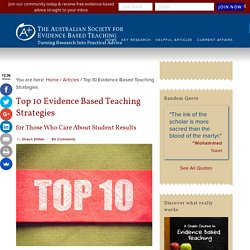
If you are reading this article, you are undoubtedly one of them. There is no doubt that teachers make a difference to how well their kids do at school. However, when you explore the thousands of research studies1 on the topic, it is apparent that some teaching strategies have far more impact than other teaching strategies do. Evidence Based Teaching Strategies Research shows that evidence based teaching strategies are likely to have the largest impact on student results.
Supporting Learning Through Effective Revision Techniques. The 15 minute forum tonight was led by yours truly.
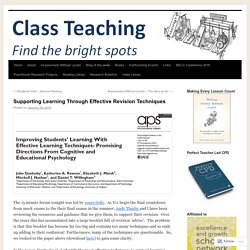
As Y11 begin the final countdown from mock exams to the their final exams in the summer, Andy Tharby and I have been reviewing the resources and guidance that we give them, to support their revision. Over the years this has accumulated into a large booklet full of revision ‘advice’. The problem is that this booklet has become far too big and contains too many techniques and so ends up adding to their confusion! This much I know about…what REALLY WORKS when preparing students for their examinations! I have been a teacher for 26 years, a Headteacher for 11 years and, at the age of 50, this much I know about what REALLY WORKS when preparing students for their examinations!
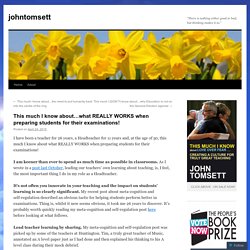
I am keener than ever to spend as much time as possible in classrooms. As I wrote in a post last October, leading our teachers’ own learning about teaching, is, I feel, the most important thing I do in my role as a Headteacher. It’s not often you innovate in your teaching and the impact on students’ learning is so clearly significant. My recent post about meta-cognition and self-regulation described an obvious tactic for helping students perform better in examinations.
Thing is, whilst it now seems obvious, it took me 26 years to discover. Lead teacher learning by sharing. He then sent me this email: The Summer Exam Season. This post was written by David Fawcett @davidfawcett27.
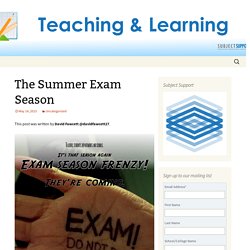
It’s that time of year again when teachers and students make that last dash towards final exams. Over the years, with new accountability towards results, the summer term can become a frenzy of revision sessions, exam advice and last ditch interventions. Obviously revision is an essential component of exam success. It is important that we pass on the message that students should be undertaking it at some level in order to ensure knowledge, information and relevant examples are stored in their memory. There is however the worry from teachers wondering whether they’ve done enough for the students.
A Grand Day Out With Hattie & Waters. Today I attended the OSIRIS ‘Outstanding Teaching Conference 2014′ in London.
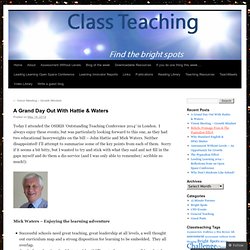
I always enjoy these events, but was particularly looking forward to this one, as they had two educational heavyweights on the bill – John Hattie and Mick Waters. Neither disappointed! I’ll attempt to summarise some of the key points from each of them. Sorry if it seems a bit bitty, but I wanted to try and stick with what they said and not fill in the gaps myself and do them a dis-service (and I was only able to remember/ scribble so much!)
: Mick Waters – Enjoying the learning adventure Successful schools need great teaching, great leadership at all levels, a well thought out curriculum map and a strong disposition for learning to be embedded. . - Learn about - Learn through - Learn how to. Feedback David Fawcett. In my previous post I looked at reasons why feedback might not stick.
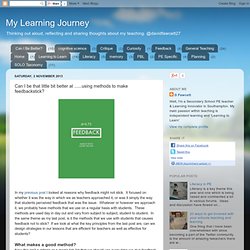
It focused on whether it was the way in which we as teachers approached it, or was it simply the way that students perceived feedback that was the issue. Whatever or however we approach it, we probably have methods that we use on a regular basis with students. These methods are used day in day out and vary from subject to subject, student to student. Ed-U-Like: DIFFERENTIATION Part 2: What it probably is. So, it might be a slightly simplistic argument, but we can perhaps start making the links between what differentiation is, what it’s not and why by paring a lesson down into its simplest form.

And this means reviewing the stuff that we might have thought of as being ‘differentiation’ previously and reconsidering it. As you may have hopefully read in my previous blogpost here, I think that differentiation is not: Foldables. Hattie infographic. Revision techniques - the good, the OK and the useless. 17 May 2013Last updated at 21:34 ET By Deborah Cohen Health Check, BBC World Service It's the time of year where students are poring over their books, trying to ensure they are prepared for their exams. Revision charts, highlighter pens and sticky notes around the room are some of the methods people use to ensure information stays in their mind. But now psychologists in the US warn many favourite revision techniques will not lead to exam success. Universities, schools and colleges offer students a variety of ways to help them remember the content of their courses and get good grades. These include re-reading notes, summarising them and highlighting the important points.
Others involve testing knowledge and using mnemonics - ways of helping recall facts and lists, or creating visual representations of the knowledge. But teachers do not know enough about how memory works and therefore which techniques are most effective, according to Prof John Dunlovsky, of Kent State University. Plan ahead. Knowing Our Students as Learners.
Plenaries. Ofsted 2012: Questioning to promote learning — From Good to Outstanding: Helping you to achieve outstanding and creative teaching and learning. Have you ever noticed that often, when someone is being interviewed, they say “That’s a good question.”? It’s usually when it’s a question they can’t answer quickly and easily. Indeed, “good” questions are ones that generally need thinking about. Inspectors must consider whether: “teachers use questioning and discussion to assess the effectiveness of their teaching and promote pupils’ learning” School inspection handbook from September 2012. A Simple Guide To 4 Complex Learning Theories.
Marginal gains. Growth mindset. Monitoring-the-learning-experience-in-our-classroom1-1b23z71. Mick Waters - Making Learning Irresistible.